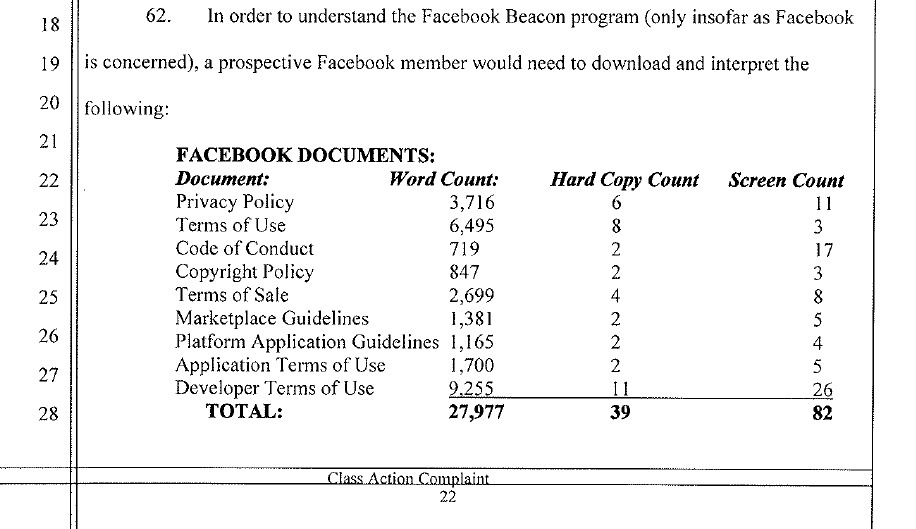Facebook and Beacon partners slapped with class action suit

Facebook - along with Beacon partners Blockbuster, Fandango, Overstock and others - has been slapped with a class action lawsuit over the missteps that were taken when the Beacon program was launched last year. (Techmeme) And now, Facebook CEO Mark Zuckerburg's own public apology - an admirable fess-up for the mistakes it made in launching Beacon - is being used against him in a court complaint filed in U.S. District Court in San Jose. So much for taking the personal approach and speaking directly with users (via a blog entry) to admit the mistakes and announce the corrections.
You'll recall that Beacon, which was released in November, was a partnership program that allowed Facebook to broadcast when a user did some sort of search or conducted some sort of transaction on a partner site - something like adding a movie to a Blockbuster.com. The most memorable incident involved a man who purchased a diamond ring from Overstock.com as a surprise Christmas gift for his wife - and then found that the purchase had been broadcast to his network of Facebook friends, including his wife.
Beacon instantly became a public relations nightmare for Facebook and, within a month, Zuckerberg was implementing changes and publicly discosing Facebook's mistakes:
We made a lot of mistakes building this feature, but we've made even more with how we've handled them. We simply did a bad job with this release, and I apologize for it... The problem with out initial approach of making it an opt-out system instead opt-in was that if someone forgot to decline to share something, Beacon still went ahead and shared it with their friends. It took us too long after people started contacting us to change the product so that users had to explicitly approve what they wanted to share. Instead of acting quickly, we took too long to decide on the right solution. I'm not proud of the way we've handled this situation and I know we can do better.
I'm no lawyer but that sounds like an awful lot of admission of guilt. I remember thinking at the time that Zuckerburg was giving up a lot of internal information about how things were handled - for good and bad - with Beacon. Disclosure can be a good thing sometimes, but did Facebook's lawyers review this public statement before it was released?
Now, it's a matter for the courts to decide. The suit alleges violations of the Electronics Communications Privacy Act, Computer Fraud and Abuse Act, Video Privacy Protection Act, California's Consumer Legal Remedies Act and California's Computer Crime Law. In addition to Facebook, the suit names Blockbuster, Fandango, Hotwire, STA Travel, Overstock.com, Zappos.com and Gamefly as defendants.
One other interesting tidbit to come from the suit. The complaint highlights, in a chart, the number of documents that would have to be downloaded and read for a Facebook member to understand the Beacon program: Nine documents that make up 39 pages or almost 28,000 words.
